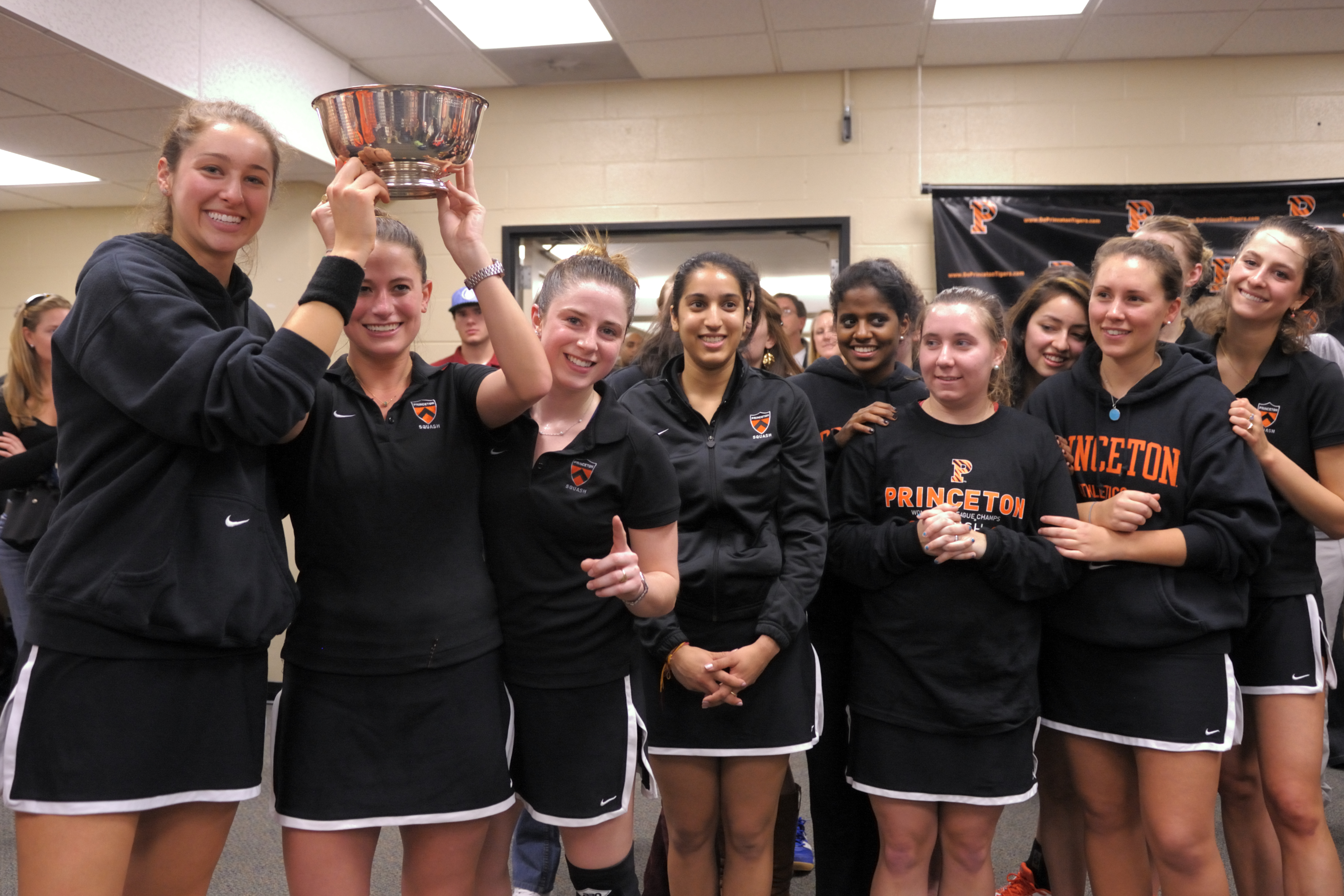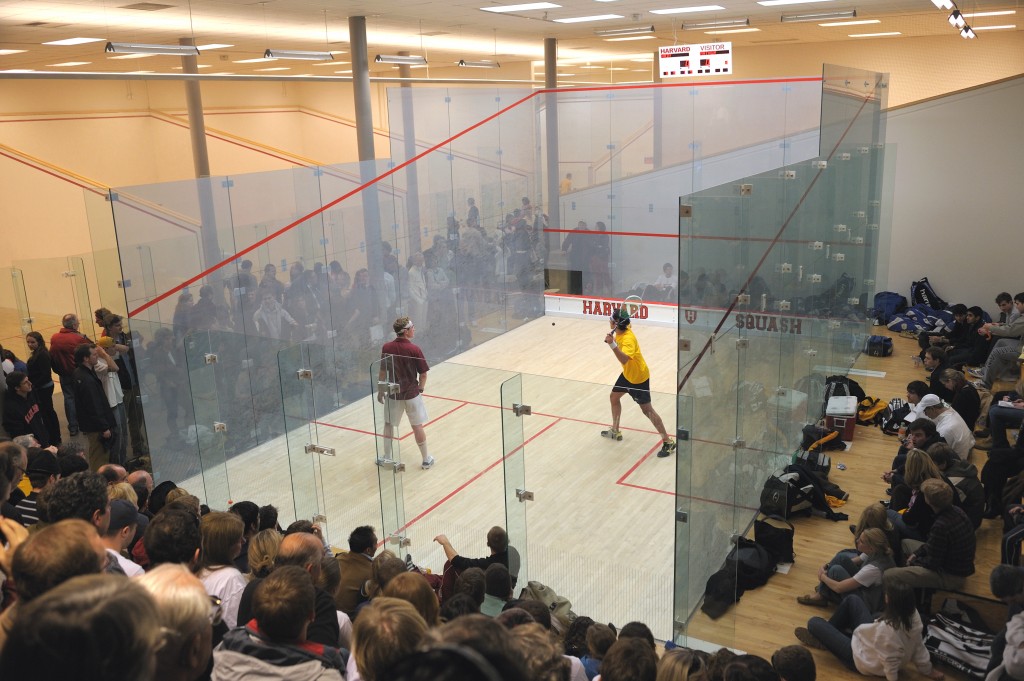
By Jay D. Prince
Photos by Debra Tessier/SquashPhotos.com
“This year was a great year for press, for not only the squash program here but for the sport,” said Trinity Men’s Coach Paul Assaiante. “To have squash featured on ESPN’s SportsCenter is unheard of…We’ve been knocking on the door of Sports Illustrated for years. The [SportsCenter] program included a section where there was a screen that showed the most dominant sporting teams in history. Trinity’s name is on the top of that screen. Then you see other teams, such as the University of North Carolina’s women’s soccer team (92 consecutive wins).”
That was way back in March of 2004 as written in the Trinity Tripod online edition. The article left out the equally impressive run of the UCLA men’s basketball team that won 88 games from 1971-1974. Trinity had blown those out of the water with 105 consecutive victories. If you’ve paid any attention at all, that streak itself seems like a lifetime ago. Now it stands at 185 at the conclusion of the 2007-2008 season. Is there any team out there that can put an end to Trinity’s unfathomable run before it hits 200? You’d be hard-pressed to find anyone to bet that Trinity won’t break the double-century mark.
To be honest, Trinity has been so dominant—they’ve only had to fight for a 5-4 team win a few times since the streak began in 1998—that squash players could be forgiven for finding the story a bit tired and sleepy. But the rest of the sporting world, including ESPN and Sports Illustrated have continued to be thoroughly impressed. Both have again featured stories on the Trinity steamrolling machine, most recently in the Feb. 4, 2008, edition of SI when the publication ran a three-page feature on the Bantams. And with the streak now at such lofty heights, who outside the squash world wouldn’t go “whoa” when put in front of them?
The driving force behind Trinity’s dominance is their head coach, Paul Assaiante, who was given the green light by school president, Evan Dobelle, back in 1995 to start combing for the world’s best junior players. To his credit, and the consternation of some, Assaiante realized and accepted the fact that the best players were not American but rather from India, Pakistan, Sweden, England, and even Zimbabwe just to name a few. Once he’d piqued the interest of a player, he set out to sell Trinity over the Harvards, Princetons and Yales.
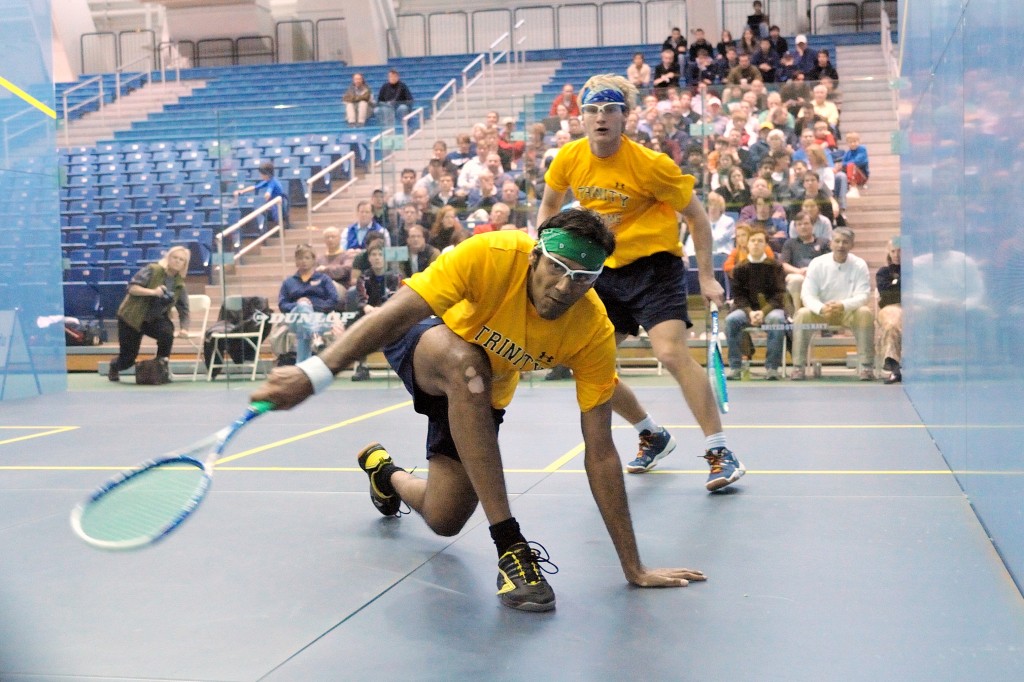
“In the beginning,” said Assaiante, “we really weren’t sure what we were getting with respect to who the boys were. Now my team is the best recruiters. In the old days we’d go out and find boys and they’d come to the campus and we’d tell our boys to take them around campus and maybe he’ll choose Trinity. But now I get e-mails from my guys saying, ‘Hey coach, this kid is a very good squash player from India.’ The beauty of it is it ensures that we get quality people.” Surprisingly enough, it isn’t the squash talent that most inspires Assaiante. It is the quality of the person playing squash, and Assaiante is quick to say that his most prideful moment was two years ago when the Trinity boys not only won the National Championship—again—but were also voted the team sportsmanship award too.
Of course it’s all well and good to assemble a team of top international junior players, but getting them to come together as a unit with winning as their absolute motivator is quite another. That too begins with Coach.
“I’m the worst,” says Assaiante. “I hate to lose, but all of my life too much of my own view of myself has been tied to winning and losing. So instead of focusing on winning, we talk about just being in the moment. As parents and coaches we have to break the cycle of viewing one’s self worth in their winning and losing.”
And that is another of Assaiante’s “prideful” things about coaching at Trinity. The streak has taken on a life of its own. “The boys take it very seriously,” commented Assaiante, “not as a source of fear, but really as a source of pride. It’s on their minds all the time. They don’t want to be the ones who blow it.”
But the question begging to be answered is how is it that a group of college kids have been able to stay focused enough, match after match, to keep the winning going? Certainly the talent of the players is obvious. But as Assaiante is quick to point out, it is Trinity’s depth that keeps the bullet train rolling. “We carry 22 kids. So what happens is when we get to play some of the second tier programs we’re using very few of our top kids,” said Assaiante. “So by the time we get to the Nationals, this team is probably the most rested team in the tournament. And I think that’s significant.” A look back over the past six years shows this to be very true. Every player gets opportunities to play, and every player has had a winning record.
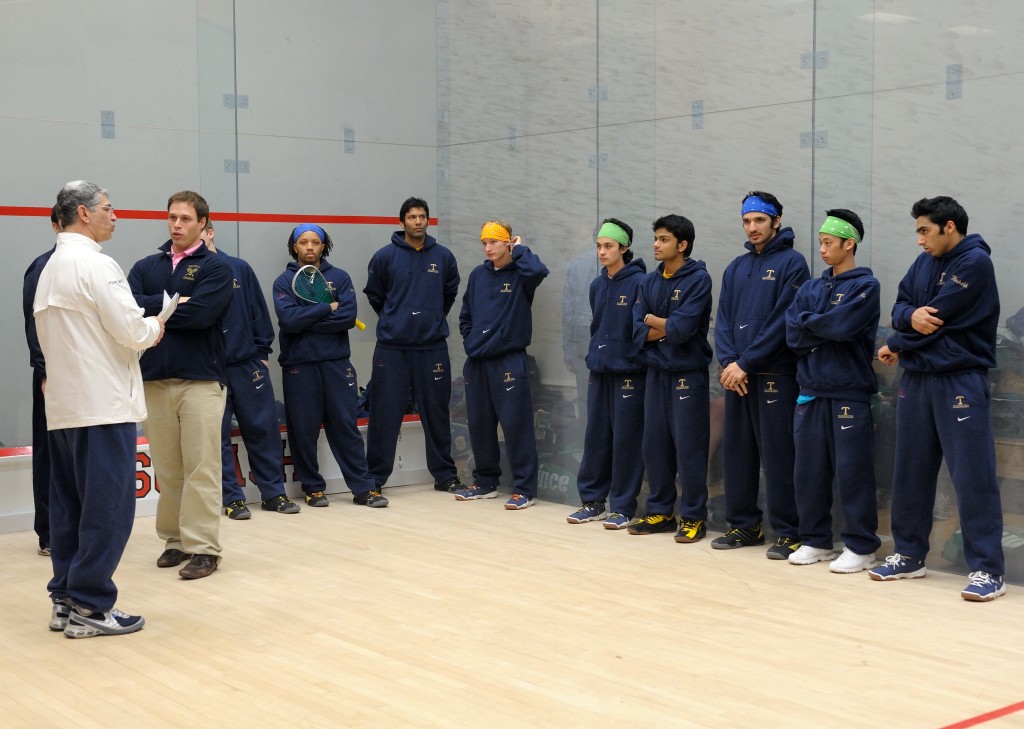
Some day, Trinity’s streak will come to an end. They all do. But the “when” is a question that is difficult to answer at best. “When this ends,” Assaiante surmised, “my hope will be that it’s because someone came to the raised bar and that we didn’t just fail. But my goal in life, here at Trinity, is for someday this program to lose the Championship and come back, and take it back, and not just fade away into the darkness.”
That will be the true test of champions. To fail and still get up off the floor with heads held high and a drive to earn their place on the mantle again. In the meantime, the Men’s National College Squash Championship still resides in Hartford, Connecticut, where you’ll find some of the most competitive challenge matches taking place week after week on the Trinity campus. Those are your rare opportunities to see a Trinity player come up short—and they provide a glimpse of what lies behind their dominance of the college game.
Princeton Repeats as Howe Cup Champions
For as consistent and predictable as Men’s College Team Squash has been since 1998, the Women’s has been, well, consistently inconsistent.
And the 2007/2008 season was no different. Princeton, which hadn’t won the Howe Cup Team Championship since back-to-back seasons in 1998 and 1999, managed to repeat that two-step this year by defeating Penn in the Howe Cup final (6-3)—just a year after completing their perfect season in which they also won the Ivy League title.
So maybe there has been some consistency. But the reality is that since 1998, there have been “mini streaks” by the women’s teams rather than the stuff that Trinity’s men have pulled off. During the Trinity Streak, five women’s teams have captured Howe Cup titles—Penn (1), Harvard (1), Trinity (2), Yale (3) and Princeton (4). Of the five, only Trinity (2002-2003), Yale (2004-2006) and Princeton (1998-1999, 2007-2008) have strung together Championship years.
Going into this season, Princeton was the odds on favorite to repeat as champions after sweeping their schedule last year. But in late January, the Lady Quakers from Penn turned that notion on its head by defeating the Tigers 5-4 in their only dual match of the regular season. Just 10 days later, Penn again squeezed out a 5-4 win, but this time at Harvard, that locked up their undefeated season (though they had to beat Dartmouth the next day) and the top-seed for the Howe Cup at Princeton.

In February, Penn got things started in the Howe Cup by overwhelming Stanford 8-1 and Princeton blew out Brown 9-0. Princeton followed that up with a 7-2 win over Yale, while Penn escaped with a 5-4 win over Trinity—to set up the rematch with Princeton in the final.
Penn entered the match with the same line up they had used in January against Princeton, but the Tigers made a couple of changes by flip-flopping their numbers five and six as well as their seven and eight. In January, Penn won at both five and seven when Britt Hebden (5) beat Kaitlin Sennatt 3-0 and Annie Madeira (7) knocked off Magie O’Toole, 3-1.
But in the Howe Cup, the changed line up for Princeton paid off when Casey Riley beat Hebden (3-0) and Carly Grabowski survived a five-game marathon after being up two-love and serving for the match in the third game.
“Casey is an amazing story,” said Princeton Coach, Gail Ramsay. “She tore her ACL in September. It was the third time she’s torn that knee, and she’d had surgery twice. She opted not to have surgery this time, but she rehabbed it for three months and started playing again in early December. After our dual match with Penn, we had enough time for another challenge match, and Casey won to move up to five. Her match with Britt had to be one of her best performances ever. It’s got to be one of her most competitive.”
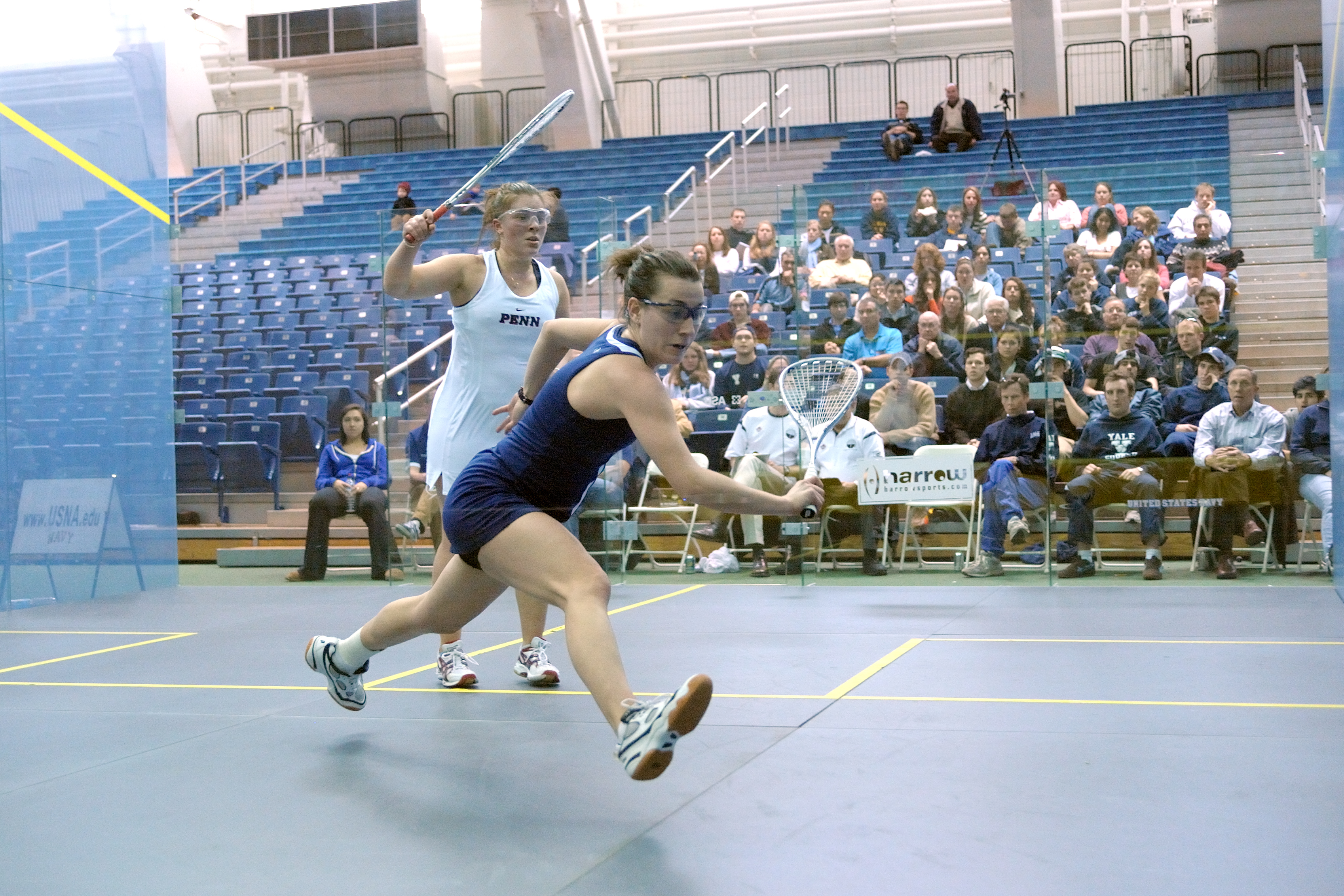
Those wins, coupled with victories by Neha Kumar (2) and Emery Maine (4)—who had both lost during the January dual match—sealed Princeton’s 16th Howe Cup Championship. “Neha had rolled her ankle in January which affected her in her match against Alisha Turner at Penn,” said Ramsay of their dual match prior to Howe Cup. “But by the time Howe Cup came, she was feeling pretty good. And Alisha had suffered an injury the day before which didn’t help her on Sunday.”
Despite falling in the Howe Cup final, Penn’s nearly flawless season (15-1) led them to the Ivy Championship (won for the fifth time in 10 years by a team that did not go on to win the Howe Cup) and leaves them in good position next season with sophomore Kristen Lange coming back for her third year.
Some might call the inability of teams to win Howe Cup titles for more than a couple years at a time, parity. A better word for it might be “exciting.” Putting together undefeated regular seasons is impressive, but to go into Howe Cup with the championship up for grabs creates palpable tension that is exhilarating.
“I like the competitiveness of all the teams at the top in women’s squash,” said Ramsay. “I like the idea that there’s five good teams out there and we’re going to have five good matches. The competition and depth makes the training better because we’re all focused on how everybody else is doing. It’s pushing everyone to improve.”
Perhaps there is consistency in the women’s game after all.
Other Intercollegiate Winners:
Men’s Team Championships
Hoehn (B) Division: Bates
Summers (C) Division: St. Lawrence
Conroy (D) Division: Colby
Chaffee (E) Division: Vanderbilt
Serues (F) Division: Georgetown
Men’s Individual Championships
Malloy Cup (B): Rushabh Vora (Trinity)
Women’s Team Championships
Kurtz (B) Division: Williams
Walker (C) Division: Vassar
Epps (D) Division: Virginia
Women’s Individual Championships
Holleran Cup (B): Johanna Snyder (Harvard)


